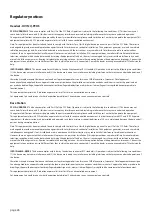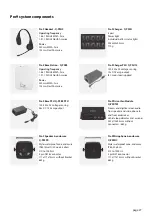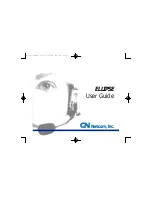
page 24
Manufacturer’s notes
Battery handling and safety guidance for Quail Digital headset batteries
Quail Digital uses Lithium Polymer (LiPo) type rechargeable batteries. On these systems the battery is
removed from the headset device to recharge it. When placed in the charger the battery will ‘fast-
charge’ to 80% capacity for up to two hours and then drop back to a trickle charge for the remaining
20% of the charge cycle. Once the battery is fully charged the charger will maintain a minimal charge
routine until the battery is removed from the charger. LiPo rechargeable batteries deteriorate in
performance and composition over time, reducing the full charge capacity and integrity of the battery.
LiPo batteries must be swapped out and disposed of in an approved manner every two years.
Battery safety guidance
•
Routinely inspect the batteries to ensure there are no signs of damage, deformity, or swelling, before
use and when returning to the charger. If the battery is deformed or the casing is cracked or otherwise
damaged, isolate it, and dispose of in an approved manner.
•
Batteries should always be either in the charger OR in a headset. Do not leave batteries out on
worktops or other places where they could become physically damaged or exposed to excessive heat
or liquids of any type.
Battery replacement schedule
•
Batteries are a consumable item and must be replaced every two years to maintain the performance
and safety of the headset system.
•
Each battery is dated with month/year of issue; see the reverse side of the battery for issue date. We
recommend that your batteries are retired at two years from the issue date.
•
Batteries with missing date information should be considered consumed and replaced.
•
You should dispose of spent batteries through approved disposal channels. Please ask your service
agent for details.
To purchase replacement batteries please contact: service@quaildigital.com or your service agent.
Disclaimer
Quail Digital accepts no liability for injury (in the absence of any negligence or other breach of duty),
loss or damage arising from use of its products as a result of a failure to use them in accordance with
the relevant instructions of use.





































